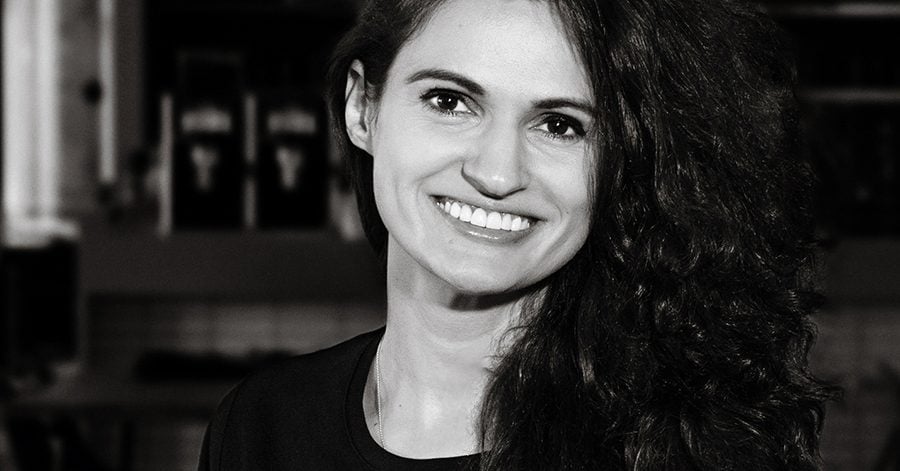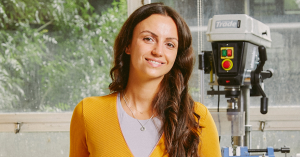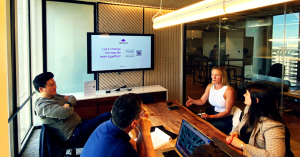Chili Piper, the B2B meeting automation app raised just over €27M in a Series B funding led by Tiger Global, an American investment company focused on global IT, Fintech, and consumer industries. This new backing follows a €15M Series A round closed in August of last year and will be used to speed up product development, sales, and marketing.
“We do have aggressive hiring plans, that’s my next big focus. I am hoping that in three years or so to be as famous as UiPath in Romania because we’re planning to go public, so I hope we can get on the same trajectory,” Alina Vandenberghe shared with The Recursive.
Alina and Nicolas Vandenberghe co-founded the company remotely in 2016 because they needed this technology for their daily tasks. Alina, Chili Piper CXO, was developing consumer apps. Nicolas, Chili Piper CEO, was in charge of the sales department for a telecom startup before the launch.
Alina Vandenberghe has a master’s in Computer Science from the Polytechnic University in Bucharest, Romania, but she currently resides in New York, America. Before she found the entrepreneurship life she worked for companies like Thomson Reuters, Bloomberg, and Pearson.
News in the B2B meeting automation niche
Chili Piper is making digital meetings happen by offering automation for teams worldwide. For some companies, meetings can mean wasted time, inaccurate reporting, and poor customer experience. Chili Piper has developed a meeting lifecycle automation that can help teams increase their productivity even when working remotely.
The new SaaS technology can be used to simplify processes and create a personalized flow before, during, and after a meeting. This helps connect people by handling inbound meeting requests, setting up follow-up conversations, even multiple guest meetings, and booking the next steps.
Today we get to discover more than where the name comes from – it was inspired by a bottle of French champagne that is called Piper High Tech. The Recursive reached out to Alina to find out what Chili Piper is planning for 2021, what are their long-term goals, and how has the pandemic affected remote working.
The Recursive: What is unique about Chili Piper compared to other meeting automation solution competitors (e.g., Calendly, HubSpot)?
Alina Vandenberghe: We don’t have competitors in our main use case, which is the reason why people buy us. We will probably get a lot of copycats soon. One reason it’s unique is that if you have a business, you typically have a form on your website. What happens is that salespeople can never reach about 60% of those people that fill out forms.
So our software looks at the form, sees if the person is a good prospect, and immediately puts them in contact with the right salesperson, either via phone call on the spot, or a meeting at a later date if it’s late in the night. So all of a sudden, you go from losing 60% to gaining 70% of your potential customers. It completely reverses the numbers, and the revenue can double. It’s amazing ROI, and it’s a game-changer for all the companies that we work with. That’s why we have such big companies on our homepage and such an incredible pool of customers we get to work with.
What are some long-term developing plans for the startup?
Until recently, we have had only one integration with a CRM, which is Salesforce, the predominant CRM of choice for most companies in the US. But we just launched an integration with HubSpot, which will be a huge one for us because it’s a CRM of choice for more companies in Europe.
So we want to do more CRM integrations and also have more complex routing in place. So even though we’re quite robust, we’re going to get even more advanced. In addition, we are focusing on making our product much easier to set up on your own, so we can serve even more companies faster.
How did the pandemic change the way people see Chili Piper, is it the beginning of “the remote work era”?
We were remote before it was trendy to be remote. Nicolas and I chose to create our company remotely because we thought that people should be productive from wherever they are. It doesn’t make sense that they’re stuck at their desks and limited by geography. Inspiration or productivity doesn’t hit you under some neon lights. During the pandemic, we acquired many more companies that wanted to make sure that their process and experience online was much better established than before.
Are you engaging with the Romanian ecosystem or do you plan to?
We have three Romanian employees right now, in product, sales, and support. I wish we had many more employees in Romania, obviously, because it’s where I’m from. But we don’t put a condition on it. Anybody in the world can apply. We just don’t get a big pipeline from Romania. I think we’re not as well-known there, yet. I hope that will change soon.
We will soon double down our efforts in Europe for expansion as well. Right now, the value is there, and the ROI is there. What I’ve noticed in Europe compared to the US in terms of how things are moving is that decisions are much slower. Whenever it comes to purchasing anything new, it’s a completely different sales process.
What would you tell the new generation of tech women from Southeast Europe looking up to you for inspiration?
It’s not enough to simply be lucky or have the necessary skills. There are still a lot of other facets of our professional development that matter a lot and need addressing that I wouldn’t have guessed when I started my career.
For sure what helped me propel into this industry is the ability to understand complex things. I had exceptional technical training because I went to an excellent high school in Romania that promotes programming. Then I went to a good university that also had high-quality training for technical skills.
But the two other skills that made a big difference are the ability to influence others and self-confidence. I didn’t have these two right away. I had to work hard on them.
One has to have the ability to inspire others to do good work because you’re never by yourself. You’re always going to have to work with a team and you’re always going to have to work with others. And if you don’t have a strong ability to encourage others and work well with them, then being an individual contributor alone is not helpful to achieving great things.







